先生のための夏休み経済教室:Summertime Economic Seminar for Teachers [Report]
「先生のための夏休み経済教室」が東京で開催(1日目:8/11)
"Summertime Economic Seminar for Teachers" @Tokyo (Day1: 8/11)
場所:東京証券取引所・東証ホール; Place: Tokyo Stock Exchange, Tosho Hall
参加者:中高校の教員100名以上; Participants: More than 100 teachers
プログラム: Program:
10:20-10:30 東証からの挨拶と新井明氏(司会): Greetings & Moderator (Akira Arai)
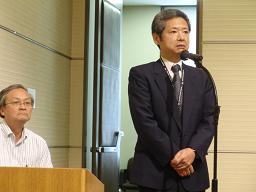
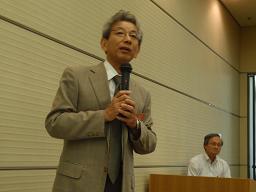
セッション1:医療・年金と経済:Economics of Medical Care & Public Pension
10:30-12:30 西村周三氏(Shuzo Nishimura)と質疑の様子(Participants)
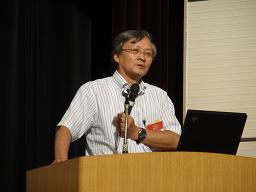
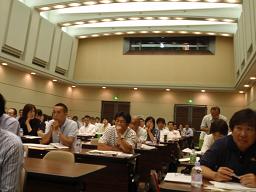
セッション2:政治経済と財政問題:Political Economy of Fiscal Problems
13:20-15:20 中川雅之氏(Masayuki Nakagawa)と質疑の様子(Participants)
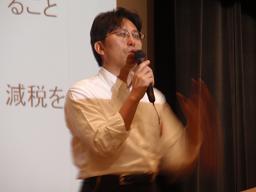
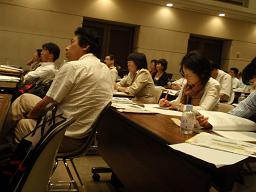
セッション3:日本経済シミュレーションゲーム(Simulation Game of Japan's Economy)
15:30-17:00 シミュレーションゲームの実践(Game Exercise for Participants)
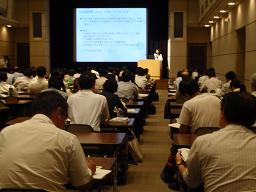
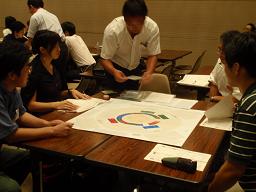
NHKテレビインタビューと1日目閉会:NHK TV Interview & Closing Remarks for Day 1
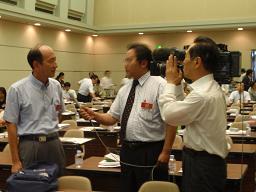
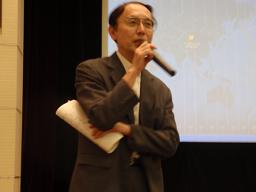
先生のための「夏休み経済教室」(1日目)内容要旨:
経済教育ネットワークは、東京証券取引所グループと協力して、8月11日と12日の2日にわたり東京の東証ホールで、中高校教員のための経済教室を開催した。まず1日目の冒頭で、東証グループの代表と総合司会の新井明氏(都立西高)が開会の挨拶を行った。
セッション1(10:30-12:30)では、西村周三氏(京都大)が「医療・年金と経済」について講演し、そこで医療費の分配面で、支払額の大半が医者や看護師やその他医療部門のスタッフの人件費として支払われることを説明。したがって、医療費の過度の抑制は、医療に携わる人の数と質にマイナスの影響を及ぼすことを指摘した。また年金については、賦課方式と積立方式のどちらがいいかは、人口減少率や経済成長率など多くの要因に依存すると述べて、そのように経済学では明確な答えが見出せない場合が多々あることを強調した。
次にセッション2(13:20-15:20)では、中川雅之氏(日大)が「政治・経済における財政問題」について講義し、まず「プライマリー・バランス」の概念を説明して、長期的に政府の財政に対する信頼を維持するためにプライマリー・バランスを回復することが重要と述べた。さらに政府支出の乗数効果を取り上げ、その乗数の大きさは消費者が近視眼的かそれとも将来の増税を予測しているかどうかに依存することを指摘した。
それに続くセッション3(15:30-17:00)では、東京証券取引所グループが「日本経済シミュレーションゲーム」を、すべての参加者を巻き込んで実施した。ゲームそのものは、中学3年生から高校生を対象に開発されたもので、経済の資金循環や政府の財政などを理解させることが目的。
最後に、篠原総一氏(同志社大)が、経済教育ネットワーク代表として閉会前の挨拶を行った。
1日目の印象ないし感想として、(1)講演の内容が高校レベルとしては適切だったかもしれないが、中学レベルとしては必ずしもそうでないこと、(2)社会保障や財政のような応用分野のトピックスを取り上げる前に、もっと基礎的なミクロやマクロ経済学をカバーすべきこと、そして(3)シミュレーションゲームはもっと簡単化し、時間をあまり取らないようにして、もっとゲームとしての面白さを加えるべきことなどが指摘できるのではないだろうか。
東京での「夏休み経済教室」の2日間のプログラムの詳細は以下を参照:
http://www.econ-edu.net/modules/tinyd3/index.php?id=31
Summertime Economic Seminar for Teachers (Day 1) Summary:
The Network for Economic Education, in cooperation with Tokyo Stock Exchange (TSE), held a two-day seminar in economics for middle/high school teachers at TSE's Tosho Hall in Tokyo on August 11-12. On the first day of the seminar, opening remarks were given by a representative of the TSE group and also by Mr. Akira Arai (Toritsu Nishi High) as the moderator.
In Session 1 (10:30-12:30), Mr. Shuzo Nishimura (Kyoto University) gave a talk on "Economics of Medical Care and Public Pension," where he emphasized the distribution side of medical expenditures that are received in large part by doctors, nurses and other personnel in the medical sector, implying that excessively suppressed medical costs would have negative consequences on the number and quality of medical personnel. Regarding Japan's public pension system, our choice between the pay-as-you-go system (fuka-hoshiki) and the reserve fund system (tsumitate-hoshiki) should depend on various factors, especially on the rates of population decline and economics growth, giving a lesson that we cannot often find unambiguous answers in economics.
In Session 2 (13:20-15:20), Mr. Masayuki Nakagawa (Nihon University) made a presentation on "Political Economy of Fiscal Problems," where the definition and meaning of the concept of "primary balance," which should be restored to maintain public confidence in the government's fiscal management in the long run. Also examined was the multiplier effect of fiscal spending, which will depend on whether consumers are myopic or anticipating future tax increases.
In Session 3 (15:30-17:00), a simulation game of the Japanese economy was conducted by the Tokyo Stock Exchange group, involving all the participants, where the game itself is intended mainly for high school students and possibly third-year middle school students to understand the money flow and public financing.
Finally, closing remarks were given by Mr. Soichi Shinohara (Doshisha University).
General impressions and comments for the first day are that (1) the presentations were appropriate for teaching at the high school level, but not necessarily at the middle school level, (2) more basic micro and macro economics subjects should be covered before applied topics such as social security and fiscal policy issues are taken up, and (3) the simulation game should be made a little simpler and less time-consuming with more fun as a game.
For the 2-day program of the Summertime Economic Seminar in Tokyo, see the following:
http://www.econ-edu.net/modules/tinyd3/index.php?id=31
"Summertime Economic Seminar for Teachers" @Tokyo (Day1: 8/11)
場所:東京証券取引所・東証ホール; Place: Tokyo Stock Exchange, Tosho Hall
参加者:中高校の教員100名以上; Participants: More than 100 teachers
プログラム: Program:
10:20-10:30 東証からの挨拶と新井明氏(司会): Greetings & Moderator (Akira Arai)
セッション1:医療・年金と経済:Economics of Medical Care & Public Pension
10:30-12:30 西村周三氏(Shuzo Nishimura)と質疑の様子(Participants)
セッション2:政治経済と財政問題:Political Economy of Fiscal Problems
13:20-15:20 中川雅之氏(Masayuki Nakagawa)と質疑の様子(Participants)
セッション3:日本経済シミュレーションゲーム(Simulation Game of Japan's Economy)
15:30-17:00 シミュレーションゲームの実践(Game Exercise for Participants)
NHKテレビインタビューと1日目閉会:NHK TV Interview & Closing Remarks for Day 1
先生のための「夏休み経済教室」(1日目)内容要旨:
経済教育ネットワークは、東京証券取引所グループと協力して、8月11日と12日の2日にわたり東京の東証ホールで、中高校教員のための経済教室を開催した。まず1日目の冒頭で、東証グループの代表と総合司会の新井明氏(都立西高)が開会の挨拶を行った。
セッション1(10:30-12:30)では、西村周三氏(京都大)が「医療・年金と経済」について講演し、そこで医療費の分配面で、支払額の大半が医者や看護師やその他医療部門のスタッフの人件費として支払われることを説明。したがって、医療費の過度の抑制は、医療に携わる人の数と質にマイナスの影響を及ぼすことを指摘した。また年金については、賦課方式と積立方式のどちらがいいかは、人口減少率や経済成長率など多くの要因に依存すると述べて、そのように経済学では明確な答えが見出せない場合が多々あることを強調した。
次にセッション2(13:20-15:20)では、中川雅之氏(日大)が「政治・経済における財政問題」について講義し、まず「プライマリー・バランス」の概念を説明して、長期的に政府の財政に対する信頼を維持するためにプライマリー・バランスを回復することが重要と述べた。さらに政府支出の乗数効果を取り上げ、その乗数の大きさは消費者が近視眼的かそれとも将来の増税を予測しているかどうかに依存することを指摘した。
それに続くセッション3(15:30-17:00)では、東京証券取引所グループが「日本経済シミュレーションゲーム」を、すべての参加者を巻き込んで実施した。ゲームそのものは、中学3年生から高校生を対象に開発されたもので、経済の資金循環や政府の財政などを理解させることが目的。
最後に、篠原総一氏(同志社大)が、経済教育ネットワーク代表として閉会前の挨拶を行った。
1日目の印象ないし感想として、(1)講演の内容が高校レベルとしては適切だったかもしれないが、中学レベルとしては必ずしもそうでないこと、(2)社会保障や財政のような応用分野のトピックスを取り上げる前に、もっと基礎的なミクロやマクロ経済学をカバーすべきこと、そして(3)シミュレーションゲームはもっと簡単化し、時間をあまり取らないようにして、もっとゲームとしての面白さを加えるべきことなどが指摘できるのではないだろうか。
東京での「夏休み経済教室」の2日間のプログラムの詳細は以下を参照:
http://www.econ-edu.net/modules/tinyd3/index.php?id=31
Summertime Economic Seminar for Teachers (Day 1) Summary:
The Network for Economic Education, in cooperation with Tokyo Stock Exchange (TSE), held a two-day seminar in economics for middle/high school teachers at TSE's Tosho Hall in Tokyo on August 11-12. On the first day of the seminar, opening remarks were given by a representative of the TSE group and also by Mr. Akira Arai (Toritsu Nishi High) as the moderator.
In Session 1 (10:30-12:30), Mr. Shuzo Nishimura (Kyoto University) gave a talk on "Economics of Medical Care and Public Pension," where he emphasized the distribution side of medical expenditures that are received in large part by doctors, nurses and other personnel in the medical sector, implying that excessively suppressed medical costs would have negative consequences on the number and quality of medical personnel. Regarding Japan's public pension system, our choice between the pay-as-you-go system (fuka-hoshiki) and the reserve fund system (tsumitate-hoshiki) should depend on various factors, especially on the rates of population decline and economics growth, giving a lesson that we cannot often find unambiguous answers in economics.
In Session 2 (13:20-15:20), Mr. Masayuki Nakagawa (Nihon University) made a presentation on "Political Economy of Fiscal Problems," where the definition and meaning of the concept of "primary balance," which should be restored to maintain public confidence in the government's fiscal management in the long run. Also examined was the multiplier effect of fiscal spending, which will depend on whether consumers are myopic or anticipating future tax increases.
In Session 3 (15:30-17:00), a simulation game of the Japanese economy was conducted by the Tokyo Stock Exchange group, involving all the participants, where the game itself is intended mainly for high school students and possibly third-year middle school students to understand the money flow and public financing.
Finally, closing remarks were given by Mr. Soichi Shinohara (Doshisha University).
General impressions and comments for the first day are that (1) the presentations were appropriate for teaching at the high school level, but not necessarily at the middle school level, (2) more basic micro and macro economics subjects should be covered before applied topics such as social security and fiscal policy issues are taken up, and (3) the simulation game should be made a little simpler and less time-consuming with more fun as a game.
For the 2-day program of the Summertime Economic Seminar in Tokyo, see the following:
http://www.econ-edu.net/modules/tinyd3/index.php?id=31
2008-08-11 22:05
nice!(0)
コメント(0)
トラックバック(0)




コメント 0